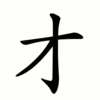才
| ||||||||
Translingual
| Stroke order | |||
|---|---|---|---|
 | |||
Han character
才 (Kangxi radical 64, 手+0, 3 strokes, cangjie input 木竹 (DH), four-corner 40200, composition ⿹𬺰丿(GHTV) or ⿻𬺰丿(JK))
References
- KangXi: page 416, character 30
- Dai Kanwa Jiten: character 11769
- Dae Jaweon: page 763, character 1
- Hanyu Da Zidian (first edition): volume 3, page 1824, character 2
- Unihan data for U+624D
Chinese
Glyph origin
| Historical forms of the character 才 | |||
|---|---|---|---|
| Shang | Western Zhou | Shuowen Jiezi (compiled in Han) | Liushutong (compiled in Ming) |
| Oracle bone script | Bronze inscriptions | Small seal script | Transcribed ancient scripts |
 |
 |
 |
 |
Characters in the same phonetic series (才) (Zhengzhang, 2003)
Pictogram (象形) – sprouting of seeds.
Etymology 1
| simp. and trad. |
才 | |
|---|---|---|
From Proto-Sino-Tibetan *tsa ~ za (“child, offspring, relatives; to come forth (as child at birth); to love; loving”) (STEDT; Schuessler, 2007). "Birth" and "natural characteristic / endowments" are semantically connected, compare 生 (OC *sʰleːŋ, *sreŋs, “live, give birth”) and its derivative 性 (OC *sleŋs, “nature; character; personality; quality”) & 姓 (OC *sleŋs, “family name”).
Derivatives: 材 (OC *zlɯː, “material; timber”), 財 (OC *zlɯː, “riches; property; money”).
Pronunciation
Definitions
才
Compounds
Derived terms from 才
|
|
|
Pronunciation
Definitions
才
Synonyms
Dialectal synonyms of 才 (“only after; only then; not ... until”) [map]
Compounds
Etymology 3
| simp. and trad. |
才 | |
|---|---|---|
| alternative forms | 乍 Min Dong 則/则 即 者 隻/只 | |
Possibly from 正 (“just”) (Taiwan MoE).
Pronunciation
Definitions
才 (Min)
Synonyms
- (just now):
- (only then):
Dialectal synonyms of 才 (“only after; only then; not ... until”) [map]
Compounds
Further reading
- “Entry #215”, in 臺灣閩南語常用詞辭典 [Dictionary of Frequently-Used Taiwan Minnan] (in Chinese and Min Nan), Ministry of Education, R.O.C., 2011.
Etymology 4
| For pronunciation and definitions of 才 – see 儕 (“(Wu) all; completely; each and every one out of a determinate quantity; always; under all circumstances”). (This character, 才, is a variant form of 儕.) |
Japanese
| Traditional | 歲 |
|---|---|
| Shinjitai | 歳 |
| Simplified | 岁 |
Compounds
- 才覚 (saikaku)
- 才気 (saiki)
- 才能 (sainō)
- 漫才 (manzai): a style of double act stand-up comedy
- 天才 (tensai): genius
Etymology 1
| Kanji in this term |
|---|
| 才 |
| さい Grade: 2 |
| kan’on |
This article is issued from Wiktionary. The text is licensed under Creative Commons - Attribution - Sharealike. Additional terms may apply for the media files.